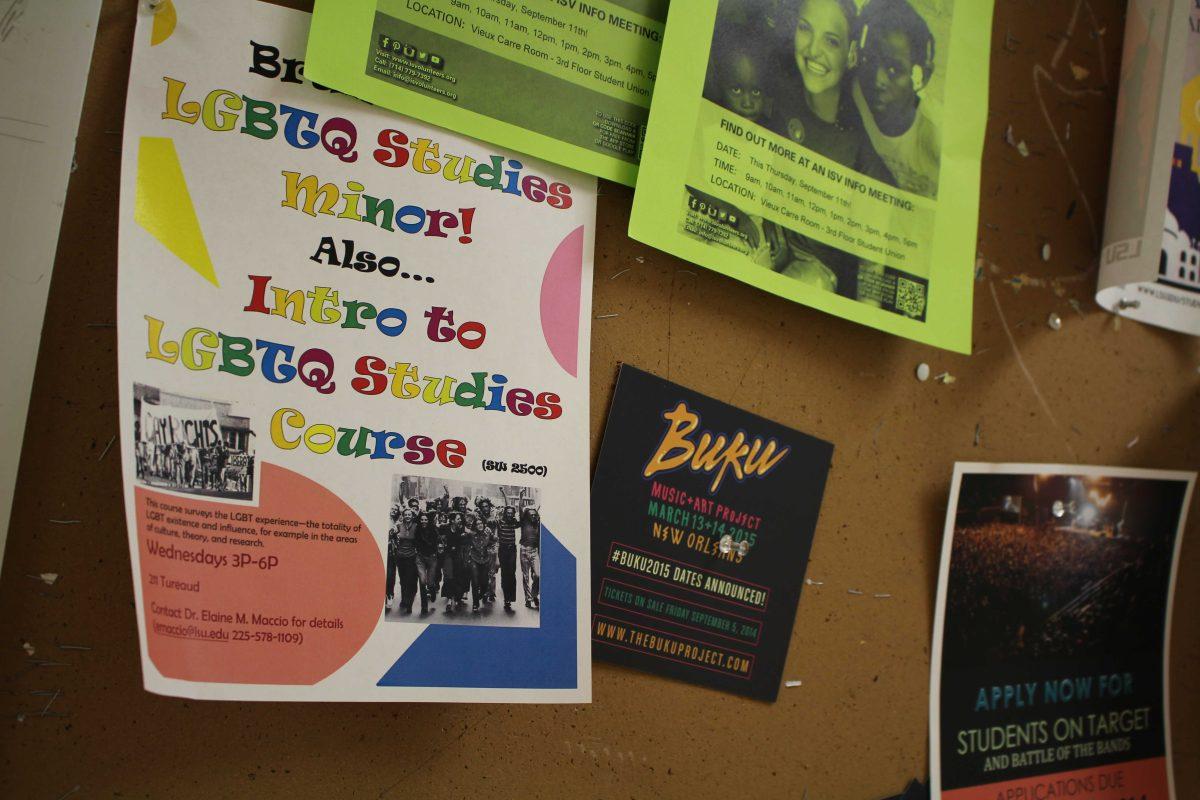It’s no secret that Louisiana hasn’t been the most accepting state of gay culture, but one LSU professor’s class aims at improving that reputation.
Elaine Maccio, associate sociology professor in the School of Social Work, believes it is time to educate students about the gay community.
Maccio started an LGBTQ minor degree program at LSU this fall. LGBTQ, which stands for lesbian, gay, bisexual, transgender and queer, is an acronym given to all members of non-heterosexual society.
Courses include Introduction to LGBTQ Studies, which Maccio tested out last year. She got the idea for a potential minor nearly three years ago.
After discovering through a class follow-up survey that students were interested in the subject, Maccio proposed the minor to former Dean of the College of Human Sciences and Education, Laura Lindsay.
“I recognized in LSU’s curriculum a paucity of courses on sexuality in general, and a gap regarding LGBTQ topics in particular,” Maccio said.
Maccio noticed many colleges around the country already had LGBTQ courses, minors, and majors possible in the curriculum. LSU would need to catch up in order to stay competitive, she figured.
LGBTQ studies are nothing new. They have been around on college campuses for more than 40 years. The University of California, at Berkeley was the first to offer a program starting in 1970.
Maccio believes the quicker students can learn about the LGBTQ community, the more prepared they will be to meet the challenge of a multicultural workplace once they graduate.
The minor has received praise from College of Human Sciences and Education Dean Damon P. Andrew, saying the program the minor “exemplifies our College’s commitment to serving society.”
According to Maccio, several alumni and students have both enjoyed an applauded the courses.
Current Intro to LGBTQ Studies student Ashleigh Keith, a senior from Lafayette, described the class as “interesting,” and said it isn’t necessary to “immerse” oneself in the material in order to benefit from learning about the gay community.
“Just being aware of other people and how they see and do things is beneficial to anyone in any space.”
The minor includes 18 hours of class work, from child and family studies, education, kinesiology, political science, social work, sociology, theatre, and women’s and gender studies.
Maccio said the purpose of the minor is to prepare students to knowledgably and sensitively work with and meet needs of the LGBTQ population in Louisiana and elsewhere.
Although student interest was high enough to create the minor, Maccio said it is difficult to know precisely how many students have signed up since the minor doesn’t require a declaration.
For some, the need for education on this topic is crucial. Julianne Martin, an Alexandria junior and president of LGBTQ campus organization Spectrum, hopes classes clear up misconceptions students have by addressing sensitive topics head-on.
“When people finally gain insight to something they don’t understand, any negative stereotypes and baseless hate they may have had will decrease,”
Martin believes the reason LSU is only now offering LGBTQ studies is because Baton Rouge and its surrounding communities are “still very close-minded” about the culture due to strong religious influences.
“New programs are proposed by faculty or departments when they have the clear capability to offer a strong academic experience for students,” says former Dean Lindsay.
Maccio and Martin encourage non-LGBTQ students to take the classes.
Maccio said the courses were never created just for LGBTQ students. “Courses for other culture-based minors weren’t designed only for students who belong to that culture.”
They resolve “misconceptions,” Martin said. “From there they can become active allies to the LGBTQ community. They can share what they learn with their friends and help increase understanding.”
University professor introduces LGBTQ minor
September 26, 2014
A flyer on the LSU campuses advertising the new program designed to educate students about the gay, lesbian and transgendered communities in the state. (Credit: Bess Casselreigh)




